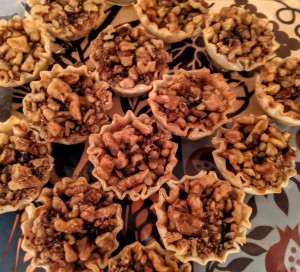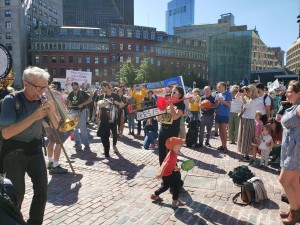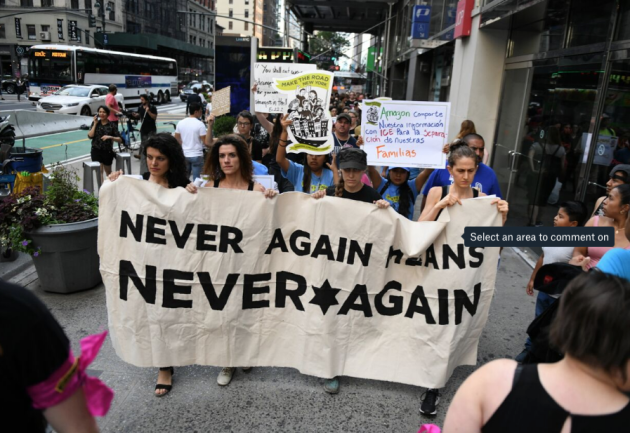Author Archives: admin
October 13, 2019 by admin
Trash to Treasure
by Anna Sacks
In my dreams, I’m constantly sorting trash. “Waste” is my inescapable obsession and addiction.
Three years ago, I left my job at an investment bank in Manhattan for a Jewish farming fellowship in rural Connecticut. Burned out, I found in the fellowship what my job lacked: time outdoors, spirituality, intentional community, and physical labor.

Adamah
One of The Adamah Fellowship’s chores, which I loved in theory but hated in practice, was to pull wheelbarrows filled with food scraps up a hill to the chickens’ enclosure. There, our chickens feasted on our scraps, then laid eggs for our consumption. Whatever scraps they didn’t eat would–by the invisible magic of fungi, bacteria, and invertebrates (FBI for short)–turn into compost, which is like Redbull for soil, but healthier. We’d then use the compost, as opposed to commercial fertilizer, on our regenerative farm to grow more food.
- No Comments
October 10, 2019 by admin
Turning Sukkot Inside Out
by Shoshana Lovett-Graff
When I first moved into my third-floor apartment, I lamented my lack of a backyard. The concept that I would not have access to the earth, even the crumbling, gravel-ridden soil of West Philly, seemed foreign to me, especially coming from Florida, where my former one-story home stubbornly squatted in the swampland surrounding it, dirt creeping up its walls and onto the window screens. I liked the idea of having a spot of land I could place a lawn chair on, where I could nestle beneath an elm tree and marvel at the shadows of buildings above me. The balcony sufficed, though the material beneath my feet was slightly corroded and paint chips occasionally floated down from the roof.
I sat on my balcony often, reading, eating, or talking with friends. The open sides kept me cool on warm nights and the roof, with a garland of lights wrapped around its interior frame, kept the rain and sun at bay. Though the balcony was connected to my apartment, it made me feel differentiated somehow. I felt more at ease, more pensive, when I sat on my folding chair and looked out on the street below.
- No Comments
October 8, 2019 by admin
Sweet Bites for the New Year
By Susan Barocas
One of my favorite sweets for as long as I can remember is baklava – flakey layers of buttery filo and crunchy nuts, all soaked through with a special honey-sugar syrup until each piece is heavy with gooey goodness. I think there must be some genetic imprinting from my Sephardic ancestors who spent centuries in the Ottoman Empire for me to love it as much as I do.
I’ve tried baklava in bakeries and restaurants all over the world. For my sister’s bat mitzvah many years ago, I came home from college and in one very long night made enough for 200 people. Years later, while waiting for my now 23-year-old son to be born, I filled the freezer with the sweet diamonds, each in an individual paper cup ready to celebrate his birth and brit.
Before, since and in between, I have made pans and pans of baklava, many of them for break-fasts because clearly syrup-soaked baklava is a perfect choice this meal. But, I have to admit that a few years ago I got tired of the baklava production. From working with the rapid-dry filo and the slow baking process to cutting the full pans of pastry without destroying the delicate layers and then the messiness of actually eating a piece, I was looking for a better way.
 I found my answer in baklava bites, filling pre-made mini-cups of filo with chopped nuts followed by a quick bake and then a syrup bath before serving the two-bite treat to…well, I’ve made bites for 200 in under an hour! It’s so easy that I now make baklava just because, no special occasion needed. And no butter or oil brushed on every filo layer either, which lowers the fat content considerably.
I found my answer in baklava bites, filling pre-made mini-cups of filo with chopped nuts followed by a quick bake and then a syrup bath before serving the two-bite treat to…well, I’ve made bites for 200 in under an hour! It’s so easy that I now make baklava just because, no special occasion needed. And no butter or oil brushed on every filo layer either, which lowers the fat content considerably.
This week I’ll be bringing plenty of baklava bites to my friend’s break-fast so we can all enjoy the sweetness of the new year together.
BAKLAVA BITES
by Susan Barocas
- 1 cup walnuts, chopped
- ½ cup pistachios or pecans, chopped
- 1/4 cup sugar
- 1 teaspoon cinnamon
- 1/4 teaspoon ground cloves
- 30 mini filo shells*
Syrup
- 1/2 cup sugar
- 1/2 cup water
- 3/4 cup honey
- 1 tablespoon lemon juice
Preheat oven to 350 degrees. In a food processor, add nuts, sugar, cinnamon and cloves. Pulse until chopped into mostly small, but still pieces. The nuts won’t be even in size and that’s fine. Nuts can also be hand-chopped, then mixed in a bowl with the sugar, cinnamon and cloves until well blended.
Place shells on a baking sheet. Spoon about 1 teaspoon of nut mixture into each shell, mounding the mixture slightly. Bake 10-12 minutes just until the shells start to turn golden brown.
Make the syrup before making the bites or while they are baking. In a small saucepan over medium heat combine the water, sugar and honey and bring to boil. Reduce heat and simmer on low for about 15 minutes until the sauce thickens a bit. Stir in the lemon juice and remove the sauce from the heat. Either cool the syrup to room temperature and pour it over the hot bites, or let the bites cool while you make the syrup and pour the hot syrup over the cooled bites. Either way, pour at least a teaspoon of the syrup over the surface of each pastry, letting it soak down into the nuts. Serve immediately or within a couple hours.
Without the syrup, the unbaked bites can also be refrigerated for 2 days or frozen for future use. Put the unbaked bites flat in a container and refrigerate or freeze. If frozen, thaw the shells for about 30 minutes. From the freezer or refrigerator, bake the shells 10-12 minutes in a 350 degree oven and proceed as directed above. The syrup can be made ahead and refrigerated for up to 3 weeks. Warm to room temperature before pouring over the hot pastries.
*Available at Middle Eastern markets, some gourmet shops and online.
- No Comments
October 8, 2019 by admin
The Never-Ending Yom Kippur Loop
By Nessa Norich
I was commissioned to create a performance for Lab/Shul’s Storahtelling–a ritual modeled after the ancient practice of reading and interpreting the Torah as it’s being read. My role as a Maven is to relate the Yom Kippur Torah reading, Leviticus 16, to our times. Here is an excerpt from my upcoming Yom Kippur performance.

Photo Credit: Tucker Mitchell
Today, we have the privilege to gather, hundreds of us within the richness and complexity of our community, in order to turn inwardand listen for what needs healing. The Torah reading today, Leviticus 16, reads like an ancient instruction manual for how to atone “for eternity.” We have listened to it for millennia as part of our yearly healing practice.
Today, I am listening for what this chapter has to teach us about healing from an ancient Jewish perspective, because I want to understand how we, as Jews, have learned to heal. I want to take stock of what healing means for us now, with thousands of years of survival behind us. Because what’s the point of showing up, if you don’t really know what you’re doing here?
- No Comments
October 2, 2019 by admin
Reflections on the Gender-Inclusive Siddur
By Eve Romm
I recently spent a Shabbat morning at Havurat Shalom, a small lay-led congregation in Somerville, Massachusetts founded in 1968 as part of the neo-Hasidic movement. I knew from the Hav’s website that their prayer book features “Hebrew and English gender egalitarian language for both God and humans,” but I wasn’t sure quite what this would mean in practice. Opening Siddur Birkat Shalom, a spiral bound volume with a blue cover, I was surprised by the sheer thoroughness and rigor of the adaptations. Not only pronouns but verb forms, adjectives, possessives and plural nouns had been expertly shifted with flawless Hebrew grammar. In addition to alternating between masculine and feminine language for God, the siddur had altered much of the language about God’s sovereignty in the traditional liturgy. The liturgical poem, Adon Olam, for example, opened with the words “source of the world who dwells…” (eden olam asher shakhna) rather than “lord of the world who rules…”. Some remained: I particularly relished the phrase “hamalka hayoshevet al kisei ram v’nisa”, “the queen who sits on a lofty and glorious throne,” which marked the transition into the main body of the morning service.
As services began, I noticed my own resistance to these changes, at the same time as my inner grammarian inspected the unfamiliar feminine forms with interest. Having come to traditional observance as an adult and taken pains to become familiar with the Hebrew liturgy, it was hard to surrender my mastery of the text and stumble over pronunciation again. Perhaps at a deeper level, having struggled with the place of women in traditional Jewish texts and communities, I was reluctant to let my guard down enough to trust a more inclusive liturgy. A lot of what I value about the Jewish tradition is the opportunity it furnishes to come into close contact with texts which are often difficult or alienating. Instead of simply rejecting the parts of the text which may wound the contemporary reader, a commitment to Jewish life means remaining in dynamic conversation with a tradition which can be at the same time sam mavet, poison, or sam hayim, life-giving elixir.
However, my brief foray into the gender-egalitarian siddur made me question my assumption that being a woman who is serious about Jewish practice and the study of Jewish texts means ceaseless wrestling with the deeply patriarchal structure of the Jewish tradition. Interestingly, though Havurat Shalom’s approach is to be exhaustively thorough in its adaptation of the liturgy to include feminine and non-hierarchical language for God, they do not alter the text of the Torah reading in this way. To my mind, this difference reflects a crucial distinction between study and prayer.
Rigorous study means serious engagement with the ways in which the text pushes the reader away and resists easy incorporation into modern life. Its goal is to understand the tradition on its own terms, and it requires a kind of interpretive resilience, a tricky separation of personal injury from scholarly interest. Prayer is not like this. The texts with which we pray, I have come to believe, should serve as a verbal technology for spiritual connection, allowing us to enter into them with relative ease so that they can be used to encounter the divine. To alter the text of the liturgy is not to censor it, it is to refine its power as a tool of worship in a particular time and place.
It is also a kind of theology in action. As the inheritors of an incredibly rich textual tradition, many Jews have learned to imagine God primarily through language. The frequent occurrence of certain names of God — Adonai tz’vaot (Lord of hosts), av harahaman (compassionate Father), eloheinu v’elohey avoteinu (our God and the God of our fathers), and melech haolam (King of the universe), to give only a few examples — certainly shaped my personal theology, although intellectually I resist their implications of a stern, masculine, God-as-judge. To a much greater extent than I had expected, even a brief experiment in using different language — makor hahayim (source of life), eden olamim (origin of the universe), shechinah (Presence), imah (Mother) — helped me to see my own gendered assumptions about God more clearly, and to begin to surrender them.
The goal of this adaptation of the liturgy, in my mind, is not that we come to think of God as primarily feminine. Instead, it is that we develop a deeply flexible and multifaceted theology, which embraces God’s ineffability more authentically and completely than the pre-modern rabbis who compiled the text of the siddur (prayer book) were perhaps able to do, being limited, as we all are, by their time. Those who resist this approach to the text of prayer often express concern that even small revisions are dangerous, potentially leading to the elimination of any part of the traditional language that might be objectionable, and losing much of what makes this ancient tradition compelling and complex in this process. I share this concern, but I am also concerned that without the willingness to, cautiously and responsibility, shape and reshape the practice of Jewish prayer, it will cease to be a source of life, joy, and meaning and become a burdensome rote observance. Our centuries-old tradition is not fragile enough to be damaged by this approach — on the contrary, diversity of practice has always made Judaism more resilient and flexible, more deeply adequate to the lived questions of its adherents, and more expansive in terms of who is able to find shelter under its canopy of peace.
Eve Romm recently finished her undergraduate studies in comparative literature and literary translation at Yale University. Her interests range from baking to Talmud study, and she’s particularly passionate about Yiddish women’s literature, the politics of Bible interpretation and translation, and the history of the book. She’s currently living in Somerville, teaching Hebrew school, and working as a freelance writer.
- No Comments
September 29, 2019 by admin
Striking For the Climate, Praying With My Feet
By Laura Mandelberg
 On Friday, Sept 20th, I danced and chanted and marched with thousands of other people at the Climate Strike in downtown Boston, as part of a worldwide day of action in which over 4 million people took part. We were striking because scientists tell us that we have less than 11 years to radically remake our society in order to prevent the worst of climate catastrophe, yet our leaders have failed to take action at anywhere near necessary scale; because the climate crisis is an issue of racial, gender, and economic justice; and because, most simply, we want to have a livable future.
On Friday, Sept 20th, I danced and chanted and marched with thousands of other people at the Climate Strike in downtown Boston, as part of a worldwide day of action in which over 4 million people took part. We were striking because scientists tell us that we have less than 11 years to radically remake our society in order to prevent the worst of climate catastrophe, yet our leaders have failed to take action at anywhere near necessary scale; because the climate crisis is an issue of racial, gender, and economic justice; and because, most simply, we want to have a livable future.
City Hall Plaza was filled with strikers of all ages, from infants to octogenarians, Gen X-ers to high school students with signs referencing the latest memes. After a program of powerful speakers and a short dance break, we marched to the State House, where a smaller group held a sit-in.
This is how I live out my Jewish values. This is how, in the words of Rabbi Abraham Joshua Heschel, I pray with my feet.
- No Comments
September 26, 2019 by admin
Finding a Spiritual Home in the Woods
by Karen Bloom

My husband Ira and I are heading down a trail in Harriman State Park, just north of the city. The setting sun’s orange light reflects against and highlights the surrounding foliage. Everything is aglow during this magical time of day. We have been hiking since morning, as we do once a week year round. It is early September and I ask Ira about going to Rosh Hashanah services at Temple Israel of New Rochelle that next week. He is not enthusiastic, sweeping his hand across the trail in front of us — “this mountain is my spiritual place”. Soon after, an idea takes root.
Truth be told, we like going to services, just not on the high holidays. It is way too crowded and it feels confining sitting indoors for long periods of time, especially on crisp fall days. As much as I have tried over the years, I get antsy, focusing on the people sitting around me more than on the prayer books before me. How right is Ira…our spiritual home is in the woods.
- No Comments
September 6, 2019 by admin
Supporting Social Entrepreneurs
By Jamie Allen Black, CEO, Jewish Women’s Foundation of New York
When Tamar Menasseh grew frustrated with the gun violence ripping apart her neighborhood on Chicago’s Southside, she did not pack up and move. Instead, she pitched a lawn chair, set up a bar-b-que, and invited neighbors to join her for a meal. After her model of community gatherings helped to lower tensions it evolved into Mothers Against Senseless Killings, which has outposts in several states, including on Staten Island, N.Y.
The sexual assaults Evie Litwok witnessed as an inmate in two federal prisons gave her purpose upon her release. Today, Litwok runs Witness to Mass Incarceration, an organization that was commissioned by the U.S. Department of Justice to investigate sexual violence against incarcerated LBQT+ women and provides people just released from prison with suitcases filled with basic supplies to help them get started on the outside.
While we can only speculate about whether the world would be a better place if women were in charge, what is clear is that many women are adept at turning their personal experiences into unique professional ventures. Based on our 20-plus years of experience funding women-led organizations, The Jewish Women’s Foundation of New York knows that not only could women solve some of the most intractable problems around the globe, but that more attention – and funds – must be designated to make these efforts successful.
- No Comments
August 29, 2019 by admin
Why We Protested Amazon on Tisha B’Av
By Rabbi Salem Pearce
A few Sundays ago, I found myself browsing in the recent nonfiction section of an Amazon retail bookstore in midtown Manhattan. I picked up Bad Blood: Secrets and Lies in a Silicon Valley Startup, by John Carreyou, the Wall Street Journal reporter who uncovered the massive fraud perpetrated by Theranos and its founder and CEO, Elizabeth Holmes. I’ve already listened to a podcast and watched a documentary on the same topic, but I am am fascinated by corporate chicanery. (Plus, Elizabeth Holmes went to my high school in Houston, Texas.) I was so absorbed in making a note on my phone to buy the book that I almost didn’t notice the group of people, holding signs above their heads, slowly and silently filling up the store. I scrambled to put the book back on the shelf. It was time to turn my attention to another Silicon Valley startup behaving badly.

Photo Credit: Gili Getz
- No Comments
August 22, 2019 by admin
In Tennessee, Fighting Back as a Jew Against the Abortion Ban Hearing
By Laurie Rice
On August 13, testifying against the comprehensive abortion ban being considered by the state legislature…
To the Senate Judiciary committee—thank you for having me here today. I am honored to speak before you. My name is Rabbi Laurie Rice. I have been an ordained rabbi for 18 years. A graduate of Northwestern University, I received my Masters of Hebrew Letters and rabbinic ordination from the Hebrew Union College-Jewish Institute of Religion. I serve on the Ethics Committee for Alive Hospice and as an Ambassador for the Amend Program through the YWCA, which works to end domestic violence in Tennessee by helping men and boys become better versions of themselves.
In the summer of 1996, I moved to Israel for my first year of rabbinic school. I lived in Jerusalem, with others studying to become rabbis, for our first of five years’ study towards ordination. That year, I met the man who two years later would become my husband. To be honest, when we went for our pre-marital counseling, we were each asked how many children we wanted to have. My husband said five. I said one. We had some things to talk about!
I said I wanted one child, but really I wasn’t even sure about having any. I was only 28. But then one day, not long after, I was ready. And when that happened, I couldn’t have a child fast enough. I was so excited to be a mom, and I couldn’t wait for my husband to be a father. I knew he would be amazing.
It didn’t take us long to get pregnant, much to my husband’s dismay. We were on our way. We bought the necessary prenatal vitamins, said goodbye to wine and raw fish, and visited the doctor for all the prescribed appointments. And then, at 22 weeks, we learned that our fetus wasn’t growing as it should, and it turned out, after a series of tests, that our fetus was a triploid, meaning it had 3 sets of every chromosome where a healthy fetus has two. I hoped this meant our baby would be bionic, but what it really meant was that our fetus would likely not come to term, and if it was born it would not make it even one year.
We. Were. Crushed. We were given two choices. To go forward and see what happened. Or to have a second trimester abortion. I sobbed. Day in and day out, I sobbed. I sobbed about the baby I would not mother. I sobbed about the dreams that died in that very moment. And I knew right away that I wanted to have the abortion. Because I wanted to have a baby. I wanted to be a mother. And I couldn’t do that until we could start over and try again.
This is not a debate between those who are for abortion and those who are against it. No one I know is FOR abortion. If a woman finds herself in a situation in which abortion is a consideration, she is in distress, and the alternative is most often either mentally or physically impairing. Or both. The debate over abortion is, in fact, a debate over a woman’s right to choose—but in our great nation today, that right has become primarily a matter of faith.
As I am in the business of faith, allow me to say a little more about this. When Alabama Governor Kay Ivey signed into law one of the nation’s most restrictive abortion bans, she invoked her faith. She said, “To the bill’s many supporters, this legislation stands as a powerful testament to Alabamians’ deeply held belief that every life is precious and that every life is a sacred gift from God.”
In January, the speaker of the Virginia House of Delegates, Kirk Cox, cited the Book of Psalms when he came out against a proposed bill that would lift restrictions on abortions. He quoted Psalm 139: “You knit me together in my mother’s womb. You watched me as I was being formed in utter seclusion as I was woven together in the dark of the womb. You saw me before I was born.”
Let me tell you how I, a rabbi, read the scripture. I, too, believe that every life is precious and a gift from God.
However, while my Christian colleagues and friends understand a fetus to represent human life, the Jewish tradition, the foundation of Christianity, does not believe that the fetus has a soul, and it is therefore not a life, as it is written in Genesis: “And God breathed the soul of life into human, and they lived.” Furthermore, Judaism refers to the fetus in Hebrew as a rodef, a pursuer. The rodef or fetus only exists because it feeds off the mother. In fact, if the presence of the fetus puts the mother’s life in danger, abortion is condoned. The wellbeing of the mother takes precedence. Existing life takes precedence over potential life, and a woman’s life and her pain take precedence over a fetus.
But the strongest argument in our Bible for permitting abortion comes from Exodus, Chapter 21, verses 22-23: “If people are fighting and hit a pregnant woman and she gives birth prematurely but there is no serious injury, the offender must be fined whatever the woman’s husband demands and the court allows. But if there is serious injury, you are to take a life for a life.”
The words “gives birth prematurely” could mean the woman miscarries, and the fetus dies. Because there’s no expectation that the person who caused the miscarriage is liable for murder, Jewish scholars argue this proves a fetus is not considered a separate person or soul.
Jewish law is also helpful when discussing abortion. The Talmud, our compendium of Jewish law, explains that for the first 40 days of a woman’s pregnancy, the fetus is considered “mere fluid” and considered part of the mother until birth. The baby is considered a nefesh, Hebrew for “soul” or “spirit” once its head has emerged, and not before.
Furthermore, Jewish tradition and scholars have also acknowledged a pregnant woman’s potential “great need” to terminate a pregnancy. It is clear that in Jewish law an Israelite is not liable to capital punishment for feticide…. An Israelite woman was permitted to undergo a therapeutic abortion, even though her life was not at stake…. This ruling applies even when there is no direct threat to the life of the mother, but merely a need to save her from great pain, which falls within the rubric of a “great need.”
Now you might be saying, “I really hope she stops quoting scripture and makes a point!” Christians and Jews could go back and forth all day long on the interpretation of scripture, because interpretation cannot be objective by the very definition of the word “interpretation.” Throughout history, scripture has been used to legitimize all kinds of evil and depravity, such as the decimation of Jews in Europe, and the right to enslave black people here in this great nation. I can tell Christians that they are interpreting scripture incorrectly, and they can say the same about me. Can any of us truly know what it is that God wants? Who among us is so full of hubris to say that we know? In a nation founded as a wellspring for all faiths, races, and creeds, do we really want to allow for one religious group to prescribe rules and decisions for all, based on one particular interpretation of scripture?
That is not America. America is about religious freedom, is it not? There is no doubt that faith informs each of our views on a variety of subjects, but that’s exactly what they are—personal views, not something for everyone else to comment or legislate on.
If this hearing is about the constitutionality of this particular bill banning all abortion, ask yourself: Are you prepared to admit that you prefer an America that is not based on religious freedom? Are we, the great state of Tennessee, prepared to join the march in making that declaration?
True religious freedom, if you value that, is a shield to protect all religions, and it is never a sword to discriminate. My tradition, the Jewish tradition, teaches that women don’t have abortions they want. I can promise you that I did not want a triploid fetus. (And Senator Bowling, since you brought up the issue of percentages, noting that only 1% of pregnancies derive from a situation of rape, allow me to point out that only 1-2% of pregnancies result in a triploid abnormality. If you are the 1% with a triploid, or the 1% who is raped, then it’s 100% for you. Period.) I did not want to learn at nearly 6 months of pregnancy that I would likely not give birth to a live baby, and that if I did it would most certainly die within the first year. Women do not have abortions they want. They have abortions they need.
To ban abortion is to blatantly diminish the rights of women to advocate for what they need. How many of you men would honestly feel comfortable with your same rights diminished?
Laurie Rice is the co-senior Rabbi of Congregation Micah in Brentwood, Tennessee. She serves alongside her husband, Rabbi Philip “Flip” Rice. When not leading and pastoring to her community or taking on a variety of social justice issues, she runs miles on the roads and trails of Nashville and hangs out with her kids.
- No Comments
 Please wait...
Please wait...